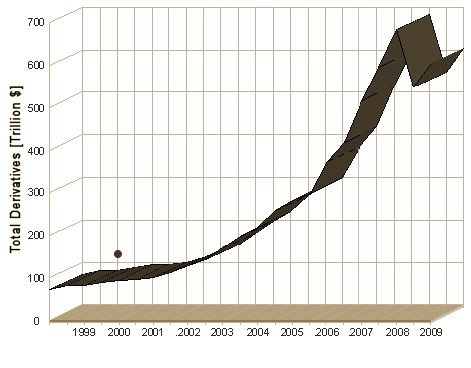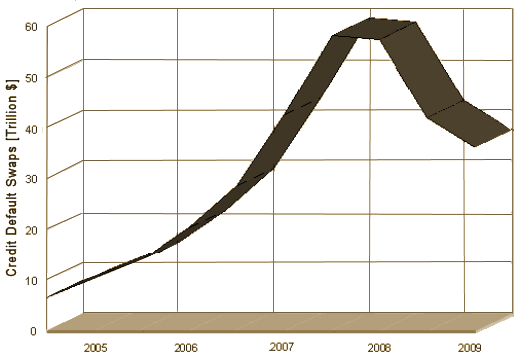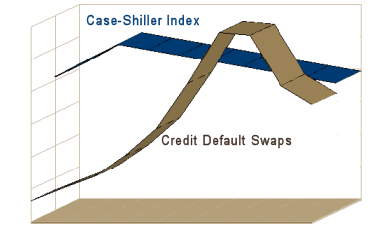Sen. Lincoln forges ahead on financial derivatives reform
Washington Post
By David Cho and Brady Dennis
April 14, 2010
An influential senator is advocating new regulations that would force the nation’s largest banks to stop trading nearly all kinds of exotic financial instruments known as derivatives – a move that would dramatically reshape several critical markets and deprive the firms of a major source of revenue. The proposal by Sen. Blanche Lincoln [D-Ark], who chairs the Agriculture Committee, is sending shudders through Wall Street. For nearly two decades, five U.S. banks – J.P. Morgan Chase, Goldman Sachs, Morgan Stanley, Bank of America and Citigroup – have acted as middlemen allowing commercial firms and financial speculators to trade vital goods such as oil, natural gas and cotton as well as contracts called derivatives. These are essentially side bets on which way such commodities, stocks and other assets move. Under Lincoln’s proposal, as described by her aides, these companies would have to spin off this activity if they want to remain banks.
Derivatives have taken center stage in the broader fight over how to regulate the financial industry. And Lincoln, who is facing a tough reelection challenge, is calling for tougher rules than what the Obama administration has sought. A Senate bill on overhauling financial regulation stops short of an outright ban on derivatives trading by these Wall Street companies, but Lincoln’s proposal could now be added to that legislation. Derivatives have been traded on Wall Street for decades, but exploded in popularity over the past decade with the help of big banks, which reaped a windfall in fees their services. Some private research groups estimate that acting as middlemen, or "swap dealers" in Wall Street parlance, generates $20 billion to $40 billion every year for big Wall Street firms…
Both the administration and Lincoln want derivatives to be traded on exchanges and approved by a clearinghouse that would cover losses in case one party to a derivative contract cannot pay up. An exemption would be given to manufacturers and commercial companies, which often use derivative contracts to guarantee the delivery of a commodity at a set price and time. However, under Lincoln’s plan, if these companies choose to trade in private, the decision may cost them more money. The firms would have to put up more capital to prepare for unexpected losses on any private trades. Lincoln’s proposal would also force all derivative contracts to be made known to both regulators and the public. The Senate bill, which was written in consultation with the administration, calls only for making derivatives known to regulators.
Republicans and industry officials blasted Lincoln’s proposal, saying it would wreak havoc on the financial system and disrupt the economy…


The Financial Services Industry loves Derivatives because they can buy and sell risk. That allows them to take more risk. The more risk you take, the greater the profit. There’s no other reason in the world to even have these markets in existence except to allow speculators to have an opportunity to make tons of money taking big risks. So what if they break the Bank, they take their booty and run. his next graph is the Credit Default Graph [2005-2009] from above with the Case-Shiller Index added. [blue] The Case-Shiller Index measures the value of an average house. Note that it peaked in 2006. The "bubble burst" then. Yet, they kept on selling the Credit Default Swaps, buying and selling risk at a fast and furious rate even though the risk on those Mortgage Backed securities was skyrocketing. It was just a matter of time before people would start defaulting on their loans and the Banks that had sold these Derivatives would be liable for them.

Obviously, this is only a rough estimate, but it looks like the value of the Credit Default Market tripled after the housing market peaked. Why didn’t they stop selling them? The handwriting was on the wall. Why should they? The sellers were getting their megabonuses from selling. The only thing that stopped them was when their Banks [Lehman, AIG, etc.] almost went under paying off these things when people stopped paying their Mortgages. The government bailed-out the Banks and the sales guys moved to their vacation homes and yachts.
Shell games, 3 card monty…greed+deception+gambling dispositions=big trouble…let Goldman Sachs disappear into the back pages of financial history and Sen. Lincoln’s hard challenge be won
Breaking News Alert
The New York Times
Fri, April 16, 2010 — 10:39 AM ET
—–
S.E.C. Accuses Goldman Sachs of Fraud on Mortgage Deals
Goldman Sachs, which emerged relatively unscathed from the
financial crisis, was accused of securities fraud in a civil
suit filed Friday by the Securities and Exchange Commission,
which claims the bank created and sold a mortgage investment
that was secretly devised to fail.
The move marks the first time that regulators have taken
action against a deal that helped investors capitalize on
collapse of the housing market. Goldman itself profited by
betting against the very mortgage investments that it sold to
its customers.
Thanks for calling attention to this. What a nice time to file suit. The scheme they are prosecuting is exactly why the derivative trading is cancer. Paulsen’s hedge fund made a billion dollars betting against Goldman’s packaged bets on some cdos that Paulsen himself had put together for Goldman Sachs to sell investors off-shore. That’s really quite absurd and really, really corrupt.